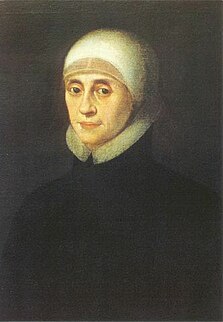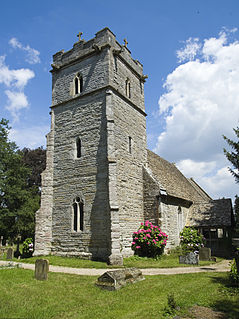
Angela Merici, or Angela de Merici, was an Italian religious educator, who is honored as a saint by the Catholic Church. She found the Company of St. Ursula in 1535 in Brescia, in which women dedicated their lives to the service of the Church through the education of girls. From this organisation later sprang the monastic Order of Ursulines, whose nuns established places of prayer and learning throughout Europe and, later, worldwide, most notably in North America.
The Congregation for Institutes of Consecrated Life and Societies of Apostolic Life is the congregation of the Roman Curia with competency over everything which concerns Institutes of Consecrated Life and Societies of Apostolic Life, regarding their government, discipline, studies, goods, rights, and privileges.
In relation to religious orders, a third order is an association of persons who live according to the ideals and spirit of a Catholic, Anglican, or Lutheran religious order, but do not belong to its "first order", or its "second order". Members of third orders, known as tertiaries, may be lay men and women or ordained men who do not take religious vows, but participate in the good works of order and may be allowed to wear at least some elements of the order's habit, such as a scapular. Less often, they belong to a religious institute that is called a "third order regular".

Mary Ward, I.B.V.M., was a Catholic nun whose activities led to the founding of the Congregation of Jesus and the Institute of the Blessed Virgin Mary, better known as the Sisters of Loreto, which have both established schools around the world. Ward was declared Venerable by Pope Benedict on 19 December 2009.
Consecrated life is a state of life in the Catholic Church lived by believers who wish to follow Jesus Christ in a more exacting way. According to the Catechism of the Catholic Church, it "is characterized by the public profession of the evangelical counsels of poverty, chastity, and obedience, in a stable state of life recognized by the Church". The Code of Canon Law defines it as "a stable form of living by which the faithful, following Christ more closely under the action of the Holy Spirit, are totally dedicated to God who is loved most of all, so that, having been dedicated by a new and special title to his honour, to the building up of the Church, and to the salvation of the world, they strive for the perfection of charity in the service of the kingdom of God and, having been made an outstanding sign in the Church, foretell the heavenly glory."

The Ursuline Monastery of Quebec City,, was founded by a missionary group of Ursuline nuns in 1639 under the leadership of Mother Marie of the Incarnation, O.S.U. It is the oldest institution of learning for women in North America. Today, the monastery serves as the General Motherhouse of the Ursuline Sisters of the Canadian Union. The community there also operates an historical museum and continues to serve as a teaching centre.

Merici College is an independent Roman Catholic secondary day school for girls located in the Canberra suburb of Braddon in the Australian Capital Territory, Australia. Established in 1959, the College caters for students in years 7 to 12. The school's Principal is Loretta Wholley.
The Ursuline High School, Wimbledon voluntary-aided, Roman Catholic Secondary School for girls aged 11 to 19. The school is based at Crescent Road and the Downs, Wimbledon, London. It was founded in 1892 by the Ursulines. It is affiliated with The Ursuline Preparatory School, its previous feeder preparatory school, as well as Wimbledon College, the high school's brother school, who have worked in partnership since 1986 and share joint Sixth Form. The school specialises in Business & Enterprise and Modern Foreign Languages and it was previously designated a Gifted & Talented Lead School.[1]
The Society of the Sisters of Saint Ursula of the Blessed Virgin is a Roman Catholic religious congregation of women founded in 1606 at Döle, France, by the Venerable Anne de Xainctonge (1587-1612). Its members are especially involved in teaching.
In the Roman Catholic Church, a secular institute is an organization of individuals who are consecrated persons and live in the world, unlike members of a religious institute, who live in community. It is one of the forms of consecrated life recognized in Church law.
Canon 710
A secular institute is an institute of consecrated life in which the Christian faithful living in the world strive for the perfection of charity and work for the sanctification of the world especially from within.
Vocational discernment is the process in which men or women in the Catholic Church discern, or recognize, their vocation in the church. The vocations are the life as layman in the world, either married or single, the ordained life and the consecrated life.

St. Rose's Secondary High School is a government school on Church Street in Georgetown, Guyana, serving students in grades 7-12 in Georgetown, Guyana. To be accepted into the school, the student must receive a certain grade in their Secondary Schools Entrance Examination (SSEE). This is the fourth highest school in Guyana, closely followed by St. Joseph High School (Guyana).
St. Ursula's College is an independent, private secondary girls' school in Toowoomba, Queensland, Australia. A Catholic school, it was established in 1931 by Ursuline nuns. The school is heavily influenced by the teachings of Saint Angela Merici. Many of the school's buildings are named after Italian cities and places such as Brescia and Lake Garda that were part of Merici's life. It enrols both boarding students and day students, and attracts many girls from remote locations throughout Queensland and New South Wales as boarders.

The Blessed Angelina of Marsciano, T.O.R., (or Angelina of Montegiove was an Italian Religious Sister and foundress, and is a beata of the Roman Catholic Church. She founded a congregation of Religious Sisters of the Franciscan Third Order Regular, known today as the Franciscan Sisters of Blessed Angelina. She is generally credited with the founding of the Third Order Regular for women, as her religious congregation marked the establishment of the first Franciscan community of women living under the Rule of the Third Order Regular authorized by Pope Nicholas V.

Ursuline College is a Catholic secondary school located in Westgate-on-Sea, in north-east Kent, England, United Kingdom. Aimed at pupils aged 11 to 19, the college is based within the Ursuline and Catholic ethos, aiding and teaching its pupils within this regime.

St Ursula's College Kingsgrove is a systemic Roman Catholic single-sex secondary day school for girls, located in Kingsgrove, a southern suburb of Sydney, New South Wales, Australia.

Blessed Zefirino Agostini was an Italian Roman Catholic priest that served in his hometown of Verona to perform his pastoral duties. He established two religious congregations in his lifetime being the Pious Union of Sisters Devoted to Saint Angela Merici and the Ursuline Sisters of the Daughters of Mary Immaculate.
The Ursuline Sisters Daughters of Mary Immaculate are members of a Verona-based Catholic congregation of sisters whose main purpose is the human and Christian training of young people.

A religious sister in the Catholic Church is a woman who has taken public vows in a religious institute dedicated to apostolic works, as distinguished from a nun who lives a cloistered monastic life dedicated to prayer. Both nuns and sisters use the term "sister" as a form of address.

















